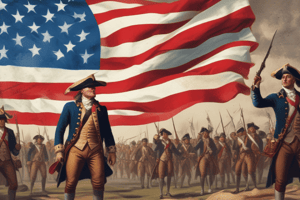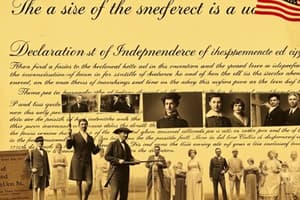Podcast
Questions and Answers
How did Thomas Paine's "Common Sense" influence the move towards independence?
How did Thomas Paine's "Common Sense" influence the move towards independence?
It swayed public opinion by presenting arguments for separation from England in an accessible way.
In May 1776, which colony took the lead by instructing its delegates to support independence, and who was the delegate that introduced the resolution to Congress?
In May 1776, which colony took the lead by instructing its delegates to support independence, and who was the delegate that introduced the resolution to Congress?
Virginia, led by Richard Henry Lee.
Why did the Congress consider it necessary to draft the Declaration of Independence before voting on the resolution for independence?
Why did the Congress consider it necessary to draft the Declaration of Independence before voting on the resolution for independence?
To provide a clear statement of reasons justifying the colonies' separation from Britain.
What is the main emphasis of the Declaration of Independence, and how did it shift the focus of the conflict with Britain?
What is the main emphasis of the Declaration of Independence, and how did it shift the focus of the conflict with Britain?
Explain the meaning of 'unalienable rights' as mentioned in the preamble of the Declaration of Independence. Provide an example of one such right.
Explain the meaning of 'unalienable rights' as mentioned in the preamble of the Declaration of Independence. Provide an example of one such right.
According to the Declaration of Independence, where does the government get its power?
According to the Declaration of Independence, where does the government get its power?
How did John Locke's ideas influence the Declaration of Independence?
How did John Locke's ideas influence the Declaration of Independence?
Explain how the Declaration of Independence transformed the nature of the conflict between the colonies and Britain.
Explain how the Declaration of Independence transformed the nature of the conflict between the colonies and Britain.
Explain how Thomas Paine's The Crisis impacted the Continental Army during the winter of 1776.
Explain how Thomas Paine's The Crisis impacted the Continental Army during the winter of 1776.
Describe the significance of the Battle of Saratoga and its impact on foreign support for the American colonies.
Describe the significance of the Battle of Saratoga and its impact on foreign support for the American colonies.
Summarize General Burgoyne's strategy and explain why it ultimately failed.
Summarize General Burgoyne's strategy and explain why it ultimately failed.
Explain the role of Marquis de Lafayette and Friedrich von Steuben in supporting the Continental Army. What specific skills did each contribute?
Explain the role of Marquis de Lafayette and Friedrich von Steuben in supporting the Continental Army. What specific skills did each contribute?
How did Washington's leadership and the element of surprise contribute to the success at the Battle of Trenton?
How did Washington's leadership and the element of surprise contribute to the success at the Battle of Trenton?
Why did the colonists feel they had the right to abolish the British government and form their own country?
Why did the colonists feel they had the right to abolish the British government and form their own country?
Compare and contrast the military advantages held by the British Commander Sir William Howe and the Colonist Commander George Washington.
Compare and contrast the military advantages held by the British Commander Sir William Howe and the Colonist Commander George Washington.
What was Nathan Hale's contribution to the war and why is it still remembered today?
What was Nathan Hale's contribution to the war and why is it still remembered today?
How did the conditions at Valley Forge, despite the suffering, ultimately contribute to the Continental Army's improved effectiveness?
How did the conditions at Valley Forge, despite the suffering, ultimately contribute to the Continental Army's improved effectiveness?
Explain how American privateers impacted the British naval strategy during the Revolutionary War?
Explain how American privateers impacted the British naval strategy during the Revolutionary War?
What was the significance of the Battle of Cowpens in the Southern campaign?
What was the significance of the Battle of Cowpens in the Southern campaign?
Describe the strategic importance of the French navy's involvement at Yorktown.
Describe the strategic importance of the French navy's involvement at Yorktown.
How did geography play a crucial role in the Battle of Yorktown?
How did geography play a crucial role in the Battle of Yorktown?
Explain the terms outlined in the Treaty of Paris (1783) that defined the territorial boundaries of the newly formed United States?
Explain the terms outlined in the Treaty of Paris (1783) that defined the territorial boundaries of the newly formed United States?
How did the use of guerilla tactics in the South impact the British military strategy and progress?
How did the use of guerilla tactics in the South impact the British military strategy and progress?
Explain why the British Parliament ultimately decided to pursue peace negotiations despite King Charles III's desire to continue the war?
Explain why the British Parliament ultimately decided to pursue peace negotiations despite King Charles III's desire to continue the war?
Flashcards
Pamphlet
Pamphlet
A small booklet or leaflet containing information or arguments about a single subject.
Richard Henry Lee's Resolution
Richard Henry Lee's Resolution
A resolution stating that the colonies should be free and independent states.
Declaration of Independence
Declaration of Independence
The document declaring the colonies' separation from Britain.
Thomas Jefferson
Thomas Jefferson
Signup and view all the flashcards
Focus of the Declaration
Focus of the Declaration
Signup and view all the flashcards
Preamble
Preamble
Signup and view all the flashcards
Self-evident truths
Self-evident truths
Signup and view all the flashcards
Natural Rights
Natural Rights
Signup and view all the flashcards
Right to Abolish Government
Right to Abolish Government
Signup and view all the flashcards
Sir William Howe
Sir William Howe
Signup and view all the flashcards
George Washington
George Washington
Signup and view all the flashcards
Nathan Hale
Nathan Hale
Signup and view all the flashcards
"The Crisis"
"The Crisis"
Signup and view all the flashcards
Battle of Trenton
Battle of Trenton
Signup and view all the flashcards
Battle of Saratoga
Battle of Saratoga
Signup and view all the flashcards
Marquis de Lafayette
Marquis de Lafayette
Signup and view all the flashcards
Valley Forge
Valley Forge
Signup and view all the flashcards
"Bonhomme Richard"
"Bonhomme Richard"
Signup and view all the flashcards
Privateers
Privateers
Signup and view all the flashcards
Lord Cornwallis
Lord Cornwallis
Signup and view all the flashcards
Battle of Cowpens
Battle of Cowpens
Signup and view all the flashcards
Benedict Arnold
Benedict Arnold
Signup and view all the flashcards
Yorktown
Yorktown
Signup and view all the flashcards
Treaty of Paris (1783)
Treaty of Paris (1783)
Signup and view all the flashcards
Study Notes
- Thomas Paine's "Common Sense" influenced opinions on the colonies' relationship with England.
- A pamphlet is a short booklet containing information or arguments.
- The Virginia Assembly let its delegates support independence in May 1776.
- Richard Henry Lee introduced a resolution to Congress stating that the colonies "ought to be, free and independent states."
- A committee, led by Thomas Jefferson, wrote the Declaration of Independence.
- On July 4, 1776, Congress approved the Declaration of Independence.
- The Declaration focused on creating a new nation rather than fair treatment from King George III.
Declaration of Independence Structure
- Preamble (introduction) states that all men are created equal and have unalienable rights, including Life, Liberty, and the pursuit of Happiness.
- Governments are instituted to secure these rights, deriving power from the governed.
- People have natural rights, and governments must protect them; based on John Locke's ideas.
- It contains a list of grievances against the British government.
- Colonists have the right to abolish an unjust government and create their own country.
War for Independence
- Sir William Howe: British Commander, led well-trained troops.
- George Washington: Colonist Commander, led poorly trained troops.
- The Battle of Long Island resulted in a British victory.
- Nathan Hale, a spy, was hanged, famously stating, "I only regret that I have but one life to lose for my country."
- British troops pursued Washington's retreating Continental Army to Philadelphia.
- Thomas Paine wrote "The Crisis" to boost morale in the colonist army.
- George Washington used "The Crisis" to motivate his troops.
- December 23, 1776, "These are the times that try men's souls".
Battles Toward Victory
- On Christmas night 1776, Washington led 2,400 men across the Delaware.
- On the morning of December 26, the troops attacked and surprised the Hessian troops in Trenton
- About one thousand mercenaries were made prisoners escaped during the night
- Attacked British forces near Princeton
- British General John Burgoyne planned to bring troops in the Hudson River valley, but the plan to cut off New England was unsuccessful.
- The Battle of Saratoga occurred on October 17, 1777, resulting in colonists' victory
- The colonists surrounded the village, and General Burgoyne surrendered.
- This victory proved that the Continental army could win, leading France to support the Americans.
- France and the colonies signed a Treaty (Alliance) in February 1777. Other countries became involved.
- Marquis de Lafayette brought French troops and became an officer in Washington's army.
Continental Army Improvement
- Volunteers from Poland, like Casimir Pulaski, trained cavalry in the Continental Army.
- Friedrich von Steuben, a German baron, trained troops the Prussian way.
- Valley Forge, Pennsylvania, winter of 1777-1778
- 11,000 soldiers suffered from cold, inadequate clothing, or housing, and many were sick.
- Civilians organized help when news spread about their condition. The Continental Army improved, and fighting resumed by spring.
The War at Sea
- Britain dominated the seas, blocking most ships from entering or leaving American harbors.
- One naval battle occurred off the coast of England.
- The American ship "Bonhomme Richard," commanded by John Paul Jones, defeated the larger British ship "Serapis."
- Approximately 800 "privateers" (armed civilian ships allowed to attack British ships and keep the cargo) forced the British navy to divert warships for merchant ship protection.
Fighting in the South
- British troops under Lord Cornwallis moved north from the Florida/Georgia line into Georgia and the Carolinas.
- Americans used guerilla tactics to slow British troops, who were more powerful.
- The Battle of Cowpen, January 1781, resulted in a Colonial victory.
- Benedict Arnold: formerly a colonial general, was now a British commander.
- Yorktown, October 1781, resulted in a Colonial victory.
- British General Cornwallis moved his troops to Yorktown, a peninsula. The French navy controlled the sea, preventing British reinforcements and escape.
- The Colonial army and French troops kept the British under siege. Cornwallis surrendered after three weeks.
- King Charles III wanted to continue the war, but the British Parliament decided that peace was preferable.
Treaty of Paris
- Treaty of Paris: End of the Revolutionary War, April 1783
- The treaty decided that American land would be from the Atlantic to the Mississippi, from Canada to the border of Florida, and that the war was over.
Studying That Suits You
Use AI to generate personalized quizzes and flashcards to suit your learning preferences.



